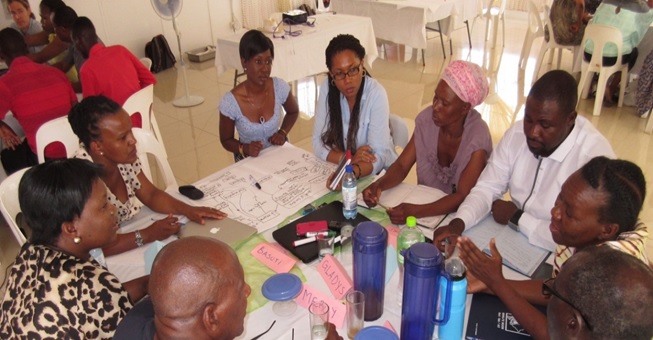By: Gina Ziervogel
Equity and justice feature prominently in the Intergovernmental Panel on Climate Change 6th (IPCC) Assessment Report Working Group II, published in 2022. The report focuses on the impacts of climate change, as well as vulnerability and adaptation.
In its summary for policymakers, the report states: “Inclusive governance that prioritizes equity and justice in adaptation planning and implementation leads to more effective and sustainable adaptation outcomes (high confidence).” This is a welcome, albeit long overdue development.
The report offers widespread evidence in support of a focus on justice across different sectors and regions. It reflects rapidly mounting concern for climate justice — in both advocacy circles and in the public discourse — and a sharp increase in the volume of information on this topic.
Arguments concerning climate justice include the need to address historical inequities, contest established power, and consider diverse perspectives and needs in planning and delivery. Only by confronting these issues directly can we deliver on the Sustainable Development Goals and climate goals.
Africa’s cities need to respond better
As outlined in the Africa chapter of the IPCC, Africa is highly vulnerable to climate risk. The continent features strongly in discussions on equity and justice, which argue for low carbon development without interfering with the economic growth.
With their concentration of people and growth, African cities are particularly important places to focus climate action. They have been slow to develop adaptation and mitigation policies and practice, but there are ample lessons worldwide and within the continent from which to draw motivation.
Organisations such as 350.org and Climate Justice Alliance, are fighting for equity and justice locally and internationally. We can glean approaches by studying and understanding these efforts, but we need to make them locally relevant.
Across the globe, cities are rapidly integrating climate action in their plans to reduce emissions and the impacts of hazards, such as droughts, floods, fires and heatwaves.
A few African cities have made progress by building justice and equity into climate response programs. Kampala is converting organic waste into briquettes for cooking. This provides an alternative livelihood strategy, reduces the number of trees cut for charcoal, and decreases the amount of waste going to landfill.
In response to neighbourhood flood risk, residents in Nairobi have invested in reducing their exposure. In addition, they have mobilized youth groups to disseminate environmental information and engage in activities such as tree planting to stabilize riverbanks.
Some local governments are ramping up their climate change management efforts. Yet, city government responses are often sector-specific and can’t succeed by themselves — the challenge is too massive and urgent.
More projects and programmes are needed that use a collaborative or co-productive approach for meeting equity and justice goals. We must have innovative ways of bringing in different sectors and actors— to really hear their perspectives and explore potential solutions. Such an approach might require safe space for experimentation.
In addition, we have to develop methods for scaling urban solutions that ensure adaptation responses meet the needs of the most at-risk groups across cities and institutionalize strategies in city planning and implementation.
Epistemic justice
Epistemic justice refers to the extent to which different people’s knowledge is recognized. Scientific evidence abounds that solving complex problems benefits from multiple types of knowledge bases. Yet city governments provide little opportunity to integrate diverse viewpoints.
In the context of inequality, ensuring that the voices of marginalized and at-risk people are included is crucial for generating appropriate locally owned solutions.
The FRACTAL project (Future Resilience for African Cities and Lands) engaged a trans-disciplinary group of researchers, officials and practitioners that worked across six cities in southern Africa between 2015 and 2021.
FRACTAL exemplifies how city stakeholders and researchers can co-produce knowledge around climate impacts and potential adaptation responses in cities such as Lusaka, Maputo, and Windhoek.
Although climate science was an important part of the project, the initial stages provided time and space for participants to share “burning questions” in their cities and collaboratively decide how to address these.
Some cities developed climate risk narratives to guide future decisions. Others developed climate change planning documents and platforms that thought about adaptation projects through a holistic lens. Importantly, participants built trust and capacity for city actors to take this work forward collaboratively.
When prioritizing adaptation actions at the city level, local governments have tended to use criteria based on their frameworks and data, providing just one perspective. However, more bottom-up data is required to meet the needs of those most at risk.
Arguments concerning climate justice include the need to address historical inequities, contest established power, and consider diverse perspectives and needs in planning and delivery. Only by confronting these issues directly can we deliver on the Sustainable Development Goals and climate goals.
Such data can better capture challenges that citizens face, such as accessing water during droughts or recovering from flooding that might have washed away homes and possessions.
A recent project in Cape Town sought to do this. Local activists from low-income neighborhoods collected data on issues around water services and explored diverse ways, including film, comics and maps as ways to share this information with other residents and city officials.
Collaborations between NGOs, researchers and local governments can strengthen the type of data available and contribute to more nuanced understanding.
The National Slum Dwellers Federation of Uganda, for instance, collected local data that informed planning and the development of solutions to reduce climate risk with sustainable building materials and improving water and sanitation services. This work positioned them to negotiate effectively with local government to support further efforts.
Across the globe, cities are rapidly integrating climate action in their plans to reduce emissions and the impacts of hazards, such as droughts, floods, fires, and heatwaves. They also are rapidly expanding opportunities to access climate funding.
The time has come for African cities to determine how they will engage in the climate action and justice space to ensure they meet the serious challenges they are confronting.
Gina Ziervogel is Associate Professor in the Department of Environmental and Geographical Science at the University of Cape Town.
For more information on COVID-19, visit www.un.org/coronavirus







